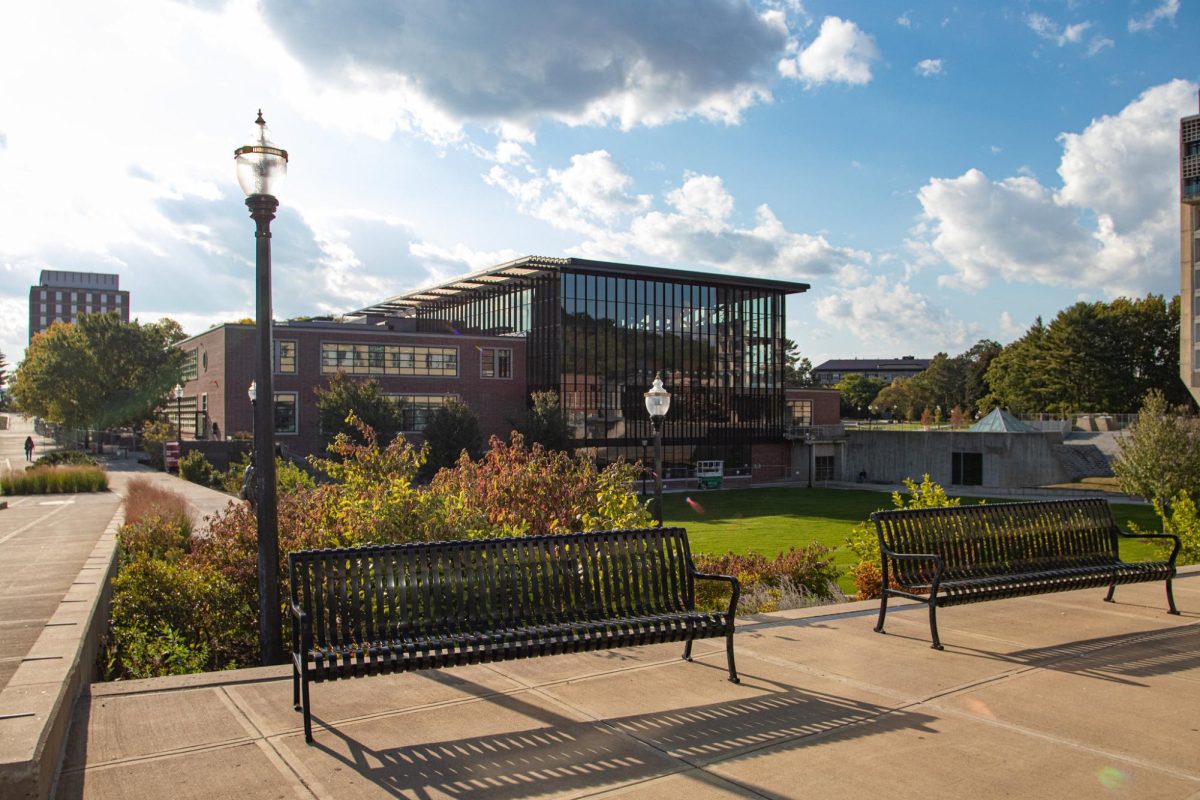
“We were averaging about 4,000 users per day at the Grab & Go, all using plastic bottles or aluminum cans, that’s about 120,000 water bottles and soda cans a month and over 800,000 cans and bottles a year,” said Ken Toong, Executive Director of Auxiliary Services. “So we thought, lets re-use them,”
This year, UMass joined in the efforts of many other colleges and universities dedicated to creating greener campuses, and eliminated plastic water bottles and aluminum soda cans at the Grab & Go. Instead of buying cans or bottles, students can fill up “compostable cups,” with soda or water, and top them off, “with compostable straws and lids,” said Toong.
Students can also fill up one of the “5,000 re-fillable dining common water bottles passed out this year, or the 10,000 water bottles passed out last year,” at the newly installed purified tap water stations in the Grab & Go’s.
This year, 60 water purifying machines were installed throughout UMass, each one costing $4,000, amounting to a grand total of $240,000. A sum Toong presumes to “make back easily within the next year, because this initiative saves the dining services a lot of money. This money can be pumped back into other areas, such as more local and sustainable foods, like the sustainable tuna that is in the tuna salad this year.”
Additionally, dining services hosted a successful green barbeque this year and intends to “give out 10,000 reusable bags on Oct. 1 to be used at the Grab & Go,” Toong affirmed.
However, Toong would “like to see no more plastic water bottles used on campus,” in the future, but is up against the daunting fact that “Americans love convenience, and the things that are easy.”
Toong realizes that convincing students to carry “their water or soda, instead of stuffing it in their backpacks, and having to wash out their refillable water bottles will take time and effort.” However, he has faith that educating the students on the positive impacts will illicit reform.
This reform is already taking shape in students like Hayley Horgan, a sophmore who works at the Franklin Dining Commons Grab & Go.“[I] like reusing plastic water bottles,” said Horgan.
Although Horgan is one of the students on campus who supports the UMass push towards a greener, less bottle-infested campus, she finds that the “paper cups in the Grab & Go don’t make sense because people don’t dispose of them properly in compost trash cans.”
Conversely, some students have another problem with the plan,
“It would be so much easier to have plastic bottles and cans back,” as do many students on campus, said freshman Iris Leonardi
According to Mother Nature Network the manufacture of plastic water bottles accounts for 47 million barrels of crude oil a year, oil that could be used to keep 12 million cars running for 12 months, according to TheDailyGreen.com. Even though plastic water bottles are highly coveted by recyclers, over 80 percent of these bottles go un-recycled, according to Silive.com. Also, according to Yourwater.net, since reusable plastic bottles take over 1000 years to decay, water bottles become wasteful and harmful towards our planet and its wildlife, as the bottles many times end up in the ocean or are doomed to a long life in a landfill.
Recycling one plastic bottle conserves enough energy to power a 60-watt light bulb for six hours, according to Timesnews,com. And as science shows, and Ken Toong stresses, “a little inconvenience goes a long way.”
Michelle Altman can be reached at [email protected].







ecologically informed • Oct 20, 2010 at 5:17 pm
dear anonymous,
in case you have not noticed the point of this article is that cans and bottles are bad for the environment, not that the school is cheap, if you are to ignorant to realize that new buildings benefit society while your daily can of coke just kills us off i am confused why you are even reading this article.
Kristen • Oct 11, 2010 at 8:57 am
I read this article when it came out in the newpaper on Thursday, September 30, and was quite excited for the next day when Ken Toong promised the reusable bags for Grab n Go would be handed out. Yet, I still see the plastic bags our and about every Grab n Go day. I have been waiting for Mr. Toong word to come true, and have been dissapointed thus far, especially seeing as it is October 11th with no bags in sight. Maybe it was a misprint on the Collegian’s part, or a date mistake on Mr. Toong’s part, but either way, I would like to see a correction or for his promise to come through.
anonymous • Oct 1, 2010 at 12:57 pm
what umass is forgetting is that grab & go is for students with busy schedules. this means that even though a student gets a meal they don’t necessarily have time to eat it at that moment. sometimes I have to wait multiple hours. now if I want a drink that I pay for I have to carry it around and avoid spilling. not to mention soda goes flat, especially with movement. I wholeheartedly agree we should be environmentally conscious but that is a poor excuse for umass to be cheap. not to mention they don’t provide soap to clean out these reusable bottles. we can afford to be building multiple new buildings and sidewalks but we can’t afford cans of soda…
christine • Oct 1, 2010 at 9:14 am
Just yesterday my “prize” in class was a G**D plastic water bottle.